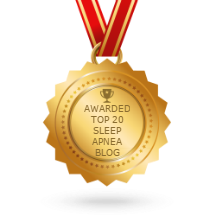Tag Archives: sleep

Should You Sleep In Bed With A Sick Spouse?
Sleep In A Bed With A Sick Spouse?
Everyone who shares a bed will face the issue of whether or not to sleep with their partner on nights when one of them has a cold or the flu.
If one partner is sick, will the other come down with it because they share a bed? Can you get a good night’s sleep when the person next to you is coughing, sneezing, or otherwise sick? If you are sick will you be more comfortable sleeping alone? The couples I interviewed for my book, Two in a Bed, offered reasons for sleeping together and also reasons to sleep apart when one of the partners has the flu or a cold. I’m not a physician and don’t have medical advice to offer you, but I can tell you what the people I interviewed said.

VIDEO: A Great White Shark Sleeping!
Video of a Great White Shark Sleeping!
Ever woke up in your home bed not knowing exactly where you are? The temporary confusion fades away as you assimilate the familiarity of your surroundings. It’s probably the same place you wake up every morning, and it’s all coming back to you. A great white shark, on the other hand, has an entirely different type of sleep experience, and it’ll likely wake up not knowing where it is.
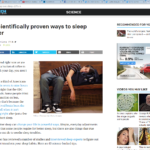
Sleep Better With These 13 Science-Backed Tips
If you’re tired right now or are relying on a bucket of coffee to get through your day, you aren’t alone.
More than a third of Americans don’t get the seven to nine hours of sleep a night that the CDC recommends. Some people think they can function on less, but usually that’s because the sleep-deprived brain loses the ability to tell when it isn’t functioning right after just a few nights of short rest.
Getting better sleep can change your life in powerful ways. Simple, everyday adjustments may be all that some people require for better shut-eye, but there are also things that true insomniacs can do to soothe sleep troubles.
Tech Insider has reviewed a number of studies and interviewed sleep experts to figure out how to best transform your resting habits. Here are 13 science-backed tips.
1. Figure out how much sleep you really need.

Caffeine Not A Cure For The Sleep Deprived
Sleep Deprivation Won’t Be Helped By Caffeine
You pulled an all-nighter — whether it be for your job or academics — with no sleep — and now you have to wake up early to attend class or commute to your workplace.
Or perhaps you are a new parent and you stayed up all night to soothe your crying baby.
Regardless of the reason for your lack of shuteye, you’re probably thinking: what could possibly wake up a sleep-deprived brain? Maybe a cup of coffee or two, right?

Check Out These 5 Summer Sleep Tips
Essential Summer Sleep Tips
by Maria Luci, editor at Maria’s Farm Country Kitchen and Rodale’s
Are you sure/That we are awake? It seems to me/That yet we sleep, we dream…
— William Shakespeare, A Midsummer Night’s Dream
Unlike the spellbound, dozing characters in Shakespeare’s beloved comedy, many of us wish we could get in a few more hours of dreaming each night. Yet, a serene, uninterrupted eight hours can be hard to come by, especially during hot midsummer nights.
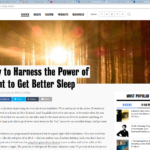
How Light Has An Affect On Your Sleep
Can You Harness Light To Get Better Sleep?
Modern life is all about innovating our way out of our inabilities. We’re not meant to fly, or live 20 stories in the air, or speak to a friend in New Zealand. And (buzzkill alert) we’re not meant to be awake when the sun don’t shine. Of all that we can now do, the latter may be the most universal. If we’ve mastered anything, it’s light. For the large part, this is good news; extra hours in the “day” mean we can socialize longer and get more work done.
Trouble is, evolution has programmed the human body to equate light with wakefulness.
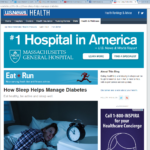
Sleep Can Help Manage Your Diabetes
Poor Sleep = High Blood Glucose Levels?
Often, people with diabetes blame what they ate or their inactivity as the culprit for an out-of-range blood glucose level. But there are other health behaviors that can affect blood glucose levels, and poor sleep habits is a common – and maybe unnoticed – one.
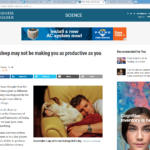
More Sleep Isn’t Always A Good Thing?
When is more sleep a bad thing?
It has long been thought that the amount of time spent in different stages of sleep was responsible for how well people were able to remember things.
But a new study done by researchers at the University of California and University of Padua shows that we may have been missing something.

What We Can Learn From Animals About Sleeping
Sleeping is a basic part of our everyday lives, yet surprisingly little is known about its purpose and evolutionary history.

Is It Possible To Sleep Through Insomnia?
Insomnia:
YOU know you’ve been awake for hours, but you dare not check the little electronic numbers on your bedside clock for fear of inducing a wave of panic.
You don’t need to look anyway, because you know exactly what they will say: “It’s early in the morning and you will be exhausted tomorrow.”
Your partner’s snores are usually a mere irritant, but in that quiet, liminal world of insomnia they take on a horrific, maddening dimension. Why can everyone else sleep except you?
If these mental roundabouts sound familiar, then take heart: you are most definitely not alone.
In homes across the state, there are plenty of Victorians burning the midnight oil, not because they have a herculean-like stamina, but because they are at war with their desperately tired bodies that refuse to drift off to sleep.
So, what exactly is insomnia? And how do you know if you have it or are just going through a phase?
Insomnia is defined in the fifth edition of the American Psychiatric Association’s Diagnostic and Statistical Manual of Mental Disorders as difficulty getting to sleep, staying asleep or having non-restorative sleep (despite opportunity for sleep), together with associated impairment of daytime functioning, with symptoms being present for at least four weeks.
Dr David Cunnington, Melbourne Sleep Disorders Centre director, differentiates between two types: acute and the less-common chronic iteration.
“Acute insomnia is where there are a certain set of circumstances that are causing sleeplessness, such as stress or illness, and this could last for a few days, sometimes a few weeks, but after that it passes,” Cunnington says.
To read the rest of this article, click here:
You can buy CPAP Machines, tubing and all of your CPAP supplies at CPAP America, 707 Mantua Pike, West Deptford, NJ 08096. Feel free to contact us at 1-800-569-0167.
You can also reach us via email here.

